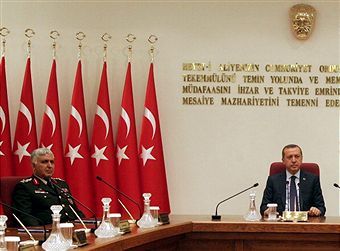 Turkish accession to the EU is apparently no more than a dream of those who desire it at
present, but it remains a point of contention across Europe. The British government, for instance, are in favour of enlargement, believing Turkey’s economy to be essential to Europe’s
continued economic strength. Accession would also hamper the goal of political integration in the EU, which is expedient to Britain.
Turkish accession to the EU is apparently no more than a dream of those who desire it at
present, but it remains a point of contention across Europe. The British government, for instance, are in favour of enlargement, believing Turkey’s economy to be essential to Europe’s
continued economic strength. Accession would also hamper the goal of political integration in the EU, which is expedient to Britain.
Not everyone in Britain shares the government’s unqualified enthusiasm for Turkey. The Home Affairs Committee has issued a report this morning, criticising aspects of the government’s policy and insisting on careful management of accession. Specifically, the committee argues that the errors made when EU enlargement extended to the Eastern Bloc in 2004 must be avoided. The committee estimate that 500,000 to 4.4 million Turks would migrate to other areas of the union within 10 years of accession unless transitional constraints are imposed.
There are also serious concerns about illegal migration. Turkey is already the door into Europe for migrants from the Middle and Near East. The Guardian claims that 350 illegal migrants cross Turkey’s porous border with Greece every day. Ankara’s lax immigration controls are a major impediment to its discussions with Brussels, and the committee urges the government to tackle this problem as a matter of urgency. And where illegal migrants lurk, organised crime thrives: 75 to 85 per cent of heroin in the EU is trafficked through Turkey, according to the report. It also devotes long passages to drug trafficking in general and the modern slave trade: people being shipped from east to west to work in, among other things, the sex trade and domestic service.
Aside from Keith Vaz’s committee, reservations are to be heard in some corridors in Whitehall and think tank land. Turkey is an increasingly enigmatic power. Its support for NATO is qualified, as evidenced by its initial reluctance to support action against Colonel Gaddafi, and it openly engages with Tehran when Europe would seek merely to contain. And doubts about Prime Minister Erdogan’s commitment to social liberalisation and human rights remain. The sceptics argue that the Turkish economy may provide much needed opportunities, but not all of Turkey’s delights are sweet.






Comments